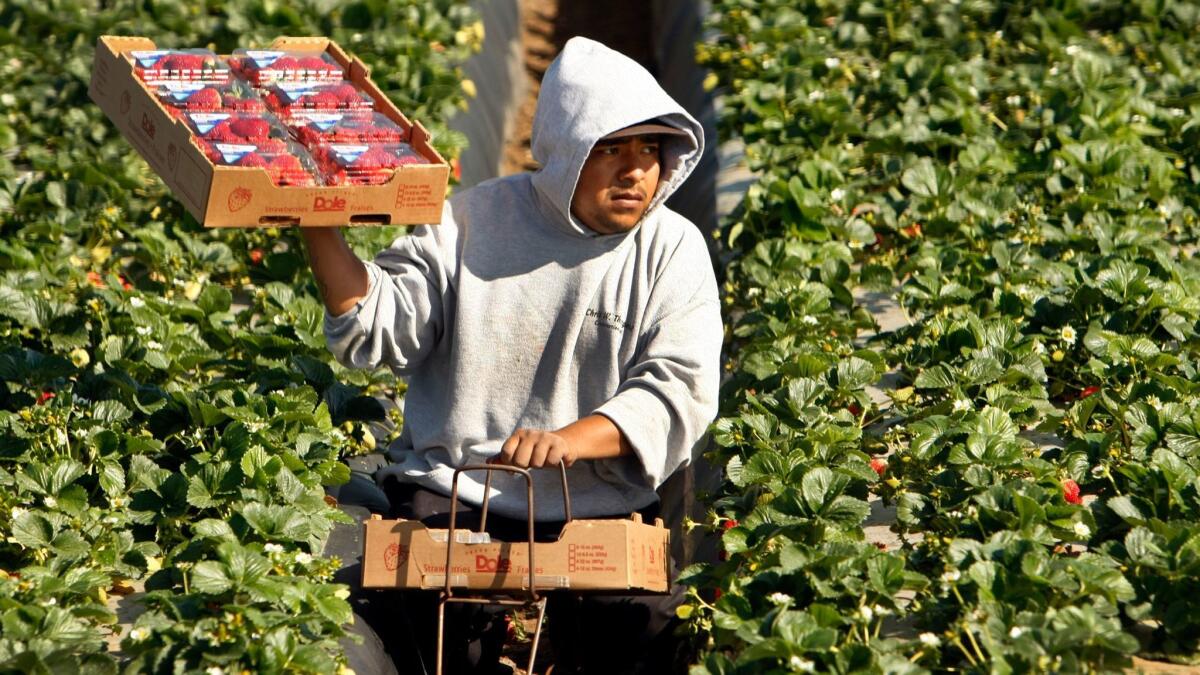Pulling back from strawberry market, Dole Food Co. to lay off 402 workers in Northern California

Dole Food Co. will lay off 402 workers from its Pajaro Valley fields and packing facilities as part of a widening move out of Californiaâs strawberry market.
The vast majority of the layoffs will fall on 268 unionized pickers, but also includes other laborers, drivers and supervisors from harvesting and cooling operations in Watsonville, according to a notice the company sent last week to state employment officials.
Last month, the company announced a similar move from its Southern California operations, including laying off 172 unionized workersin the Oxnard area, according to state records.
Dole spokesman William Goldfield said he knew of no other planned layoffs elsewhere in the state. Dole grows and packs berries in the adjacent Salinas Valley and in the Santa Maria and Coachella valleys farther south.
âThis is part of an ongoing initiative to evaluate all berry operations to ensure they remain aligned with our growth objectives and position us to remain competitive in the market place,â Goldfield said.
The moves shocked Watsonville Mayor Oscar Rios.
âAnytime a plant is phased out, itâs a loss for the workers and a loss for the city,â Rios said.
âFor the most part, it looks like theyâve decided to pull out of berries,â said Armando Elenes, a spokesman for the United Farm Workers union, which represents the workers in Watsonville and Oxnard.
Elenes added that he has heard of at least two other berry companies that might shut down operations tin the Pajaro and Salinas valleys.
UFW still represents several hundred workers in the raspberry and mushroom industry in the region, Elenes said.
Growers statewide have complained of a worsening labor shortage that has pushed wages up and driven them to recruit more foreign guest workers.
In addition, new state rules that shortened the work week and require more overtime hours have added to costs, while increased restrictions on the use of fumigants also have put pressure on growers.
Dole Food Co., the largest producer of fruit and vegetables worldwide, is struggling with nearly $1.3 billion in debt, low operating margins and declining revenue. The company, owned by Los Angeles billionaire David H. Murdock, 94, has pledged to slim down its international real estate holdings ahead of a stock offering that would take the company public for the third time in its history.
In addition to its 10-acre headquarters property in Westlake Village, Dole is trying to sell 14,800 acres of unproductive agricultural land, valued at $171 million, on the Hawaiian island of Oahu, according to Securities and Exchange Commission filings.
Sale of the headquarters property hinges on a tax-related swap for a pineapple-themed park on Oahu that is owned by Murdockâs Castle & Cooke Properties, a privately held real estate company.
Goldfield, the Dole spokesman, said he knew of no plan to uproot the staff from the Westlake Village headquarters. But officials in North Carolina have spoken previously about a potential relocation to Murdockâs sprawling research campus in Kannapolis, a city in that state where both Murdock and Dole operate research facilities.
Dole owns and operates some 124,000 acres worldwide, according to its prospectus. But very little of that property lies in the mainland U.S. â just 1,600 acres spread across five states, according to company filings with the SEC. The rest of its U.S. farming operations are on roughly 19,000 acres of leased land in those states, company records show.
It was unclear how much strawberry acreage Dole might relinquish in Santa Cruz County, where Watsonville is located, and in neighboring Monterey County.
Watsonville suffered from the loss of the canning and frozen vegetable industry in the late 1980s, then was severely damaged in the 1989 Loma Prieta earthquake. The city has slowly recovered, attracting small manufacturing businesses such as Fox bike shocks and a FedEx hub, said Rios, the mayor. But agriculture remains the top employer for the city of about 54,000 people â 19% of whom live below the federal poverty line, according to the U.S. Census.
On Thursday, city officials had just celebrated the framing of a 46-unit affordable housing complex, only to hear the news of the layoffs.
âYou can just imagine,â Rios said of the news. âItâs a big hit.â
Follow me: @LATgeoffmohan
UPDATES:
12:30 p.m.: This article was updated with comment from a Dole spokesman
This article was originally published Sept. 1 at 7 p.m.
More to Read
Inside the business of entertainment
The Wide Shot brings you news, analysis and insights on everything from streaming wars to production â and what it all means for the future.
You may occasionally receive promotional content from the Los Angeles Times.











